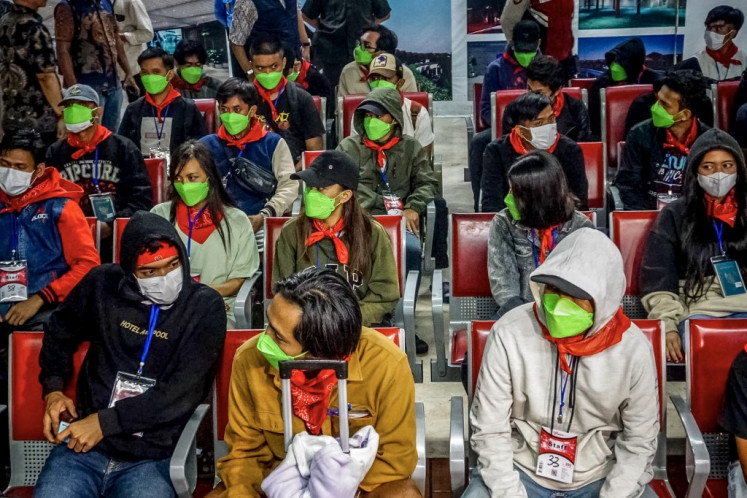Popular Reads
Top Results
Can't find what you're looking for?
View all search resultsPopular Reads
Top Results
Can't find what you're looking for?
View all search resultsBI doubles forex swap with Japan to $22.7 billion
Bank Indonesia (BI) has signed a bilateral foreign exchange (forex) swap agreement with Japan, another measure that will help the central bank cushion the economy against external pressure, including possible capital outflows resulting from the US monetary authorityâs plan to taper its quantitative easing
Change text size
Gift Premium Articles
to Anyone
B
ank Indonesia (BI) has signed a bilateral foreign exchange (forex) swap agreement with Japan, another measure that will help the central bank cushion the economy against external pressure, including possible capital outflows resulting from the US monetary authority's plan to taper its quantitative easing.
BI signed on Tuesday a bilateral swap agreement with Bank of Japan that will give the Indonesian central bank access to over US$22.7 billion in fresh greenbacks that could be retrieved at any time in anticipation of a crisis.
This means that additional forex reserves that BI can tap from the Japanese central bank will see an almost 100 percent increase, as the swap agreement between the two central banks previously stood at $12 billion.
'The swap agreement is very positive for the Indonesian economy ' it is a step taken by Bank Indonesia in anticipation of upcoming uncertainty in the external environment,' BI Governor Agus Martowardojo said in a statement on Tuesday.
'The swap agreement is also a commitment from both countries, Japan and Indonesia, to strengthen coordination to promote financial stability in the two countries, as well at the regional level,' he added.
The recent deal with Japan is more flexible than BI's previous agreements as it includes a crisis prevention element, meaning that the funds can be utilized any time to strengthen forex reserves even if an economic shock has yet to materialize, according to BI spokesperson Difi Johansyah.
The latest swap agreement is also a reflection of BI's aggressive efforts to strengthen its forex reserves as the country braces for greater shocks ahead of a more volatile financial market in 2014, ahead of possible tapering of US quantitative easing.
BI's forex reserves stood at $97 billion at the end of last month, rising significantly from $92.7 million in July, as the central bank stepped back from supplying dollars in the currency market.
BI's forex reserves are also expected to get a boost from the bilateral swap agreements that it signed this year with China and South Korea, which are equivalent to $15 billion and $10 billion, respectively.
'The good thing about the latest swap deal with Japan is that it is in dollars, while only a small fraction of [previous bilateral swap deals with] China and South Korea were convertible to dollars,' said Anton Gunawan, chief economist at Bank Danamon. 'It's good for us because the dollars can be utilized directly to intervene in the market.'
Indonesia's central bank also said it could buy Japanese government bonds and bond repurchase agreements held by Japanese banks to help the country bolster liquidity in the rupiah in case of a financial crisis.
The rupiah, Asia's worst performing currency, is among the most vulnerable to capital outflows from a tapering in monetary stimulus by the US Federal Reserve, due to concerns over Indonesia's sizeable current-account deficit.
The rupiah fell 1.3 percent from Dec. 6 to 12,118 per dollar as of 4:13 p.m. in Jakarta, taking its drop since the end of October to 7 percent, data compiled by Bloomberg shows. It touched 12,122 earlier, the weakest level since March 2009. India's rupee lost 1.1 percent to 62.075 during the five days, snapping a three-week gain.










